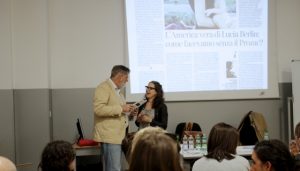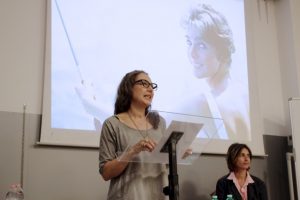Women Writers and the Short Story: Tribute to Lucia Berlin
On May 30, 2016 the Institute for Creative Writing and Literary Translation presented a tribute to one of the late American women writers, Lucia Berlin.
Creative writing professor and writer Elizabeth Geoghegan and screen and fiction writer Chiara Barzini read from Berlin’s work and shared their visions of Berlin as an artist and a woman.
Berlin, born in 1936, published a total of 77 short stories. Her work is partially collected in Homesick (1991), So Long (1993), and Where I Live Now (1999). She lived in Santiago, Berkeley, and Mexico City, among other places. She worked numerous jobs before starting to teach at the University of Colorado in 1994. Throughout her life, she had to overcome several challenges, including three failed marriages and a lifelong problem with alcoholism. She died in Marina del Rey, California in 2004.
Prof. Geoghegan opened the event by reading her essay “Smoking with Lucia,” recently published in The Paris Review. Geoghegan, who knew Berlin personally and corresponded with her for years, described Berlin as “a writers’ writer,” a master of the short and short short story who never received the attention and acclamation she deserved. Her piece is a moving reminiscence of Berlin’s irony, resilience, and creative genius, emerging through precious moments of intimacy and shared cigarettes. It is Geoghegan’s dream to finally see Berlin’s work reach a wide audience.
By reflecting upon Berlin’s eventful and struggle-filled biography, Barzini noted that the writer seems to have lived not for 68 years, but for centuries. Barzini read Berlin’s short story “Sex Appeal,” which tells of the controversial initiation of a young girl to the “craft” of seduction. Next, Geoghegan read Berlin’s story “Unmanageable,” a painfully honest rendition of the sleepless night of an alcoholic.
During the Q&A section, both Geoghegan and Barzini praised Berlin’s capacity to mix high and low culture, and to combine a wide knowledge of the world with an overwhelming sense of claustrophobia in her writing. All the participants discussed the struggles of women writers, raising questions such as: does the common assumption that women tend to write autobiographically have any validity? And is that, perhaps, part of their appeal?
Both speakers described Berlin as an inspirational, true intellectual. Less interested in popularity than in the quality of her craft, she was especially loved by her students and fellow writers for her humility and intellectual generosity.







